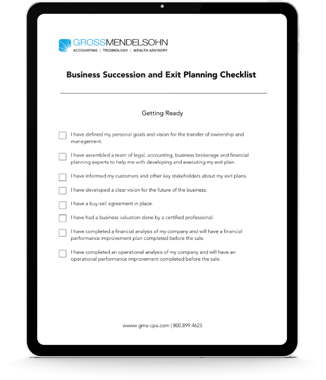Even when you love your work, it's inevitable that you will eventually have to leave your role as the owner of your construction company. The bad news is, there is significant planning to do. The good news is, there are things you can do to leave your construction business in good hands and get real value out of your business in the transaction.
Let's take a look at some of those methods.
1. Choose the Right Successor
In the old days, many construction companies were family-owned businesses and were almost always passed down to the owner’s son or daughter. But with more kids going to college than ever before, along with the trend of smaller families and children wanting to pursue alternative careers, your successor may not necessarily share your last name.
However, third party buyers are generally looking to pay a lower multiple of earnings than most owners expect, making internal succession to key employees a more viable option. Identifying early on one or a group of key employees who can continue your legacy once you retire is an important step in ensuring optimal value for your construction business.
2. Plan Ahead
Exit planning should begin long before you even start heading out the door. Ideally, your succession plan was something you considered when you started your business. You’ll want to allow at least five or six years to build a thorough plan to transition out of your business.
Once you’ve selected a successor, plan to dedicate two years at a minimum to helping him or her with the transition. If you want to get REAL value out of your business, expect a seven- to ten-year buy-out term. Exit planning doesn’t have to be complicated, but it does require time.
To get a realistic look at how prepared you are to leave your business and avoid pitfalls during the planning process, use a business exit planning checklist.
3. Communication is Key
Once you’ve identified your successor, provide them with the training and tools to succeed long after you’ve exited the business. Despite being a strong, capable candidate, even the best successor will need time to find their stride. Training and education are important parts of the transition process, and exiting your business with a sure, confident new leader will ensure long term value of your business as you move through your own exit process.
4. Be Realistic
Compared to other industries, construction businesses typically have more volatile earnings streams as contracts come and go. The best exit plans are realistic about future cash flow, and consider customer base, management strength and market exposure. Getting real value for your business means being realistic about future earning potential.
5. Customize Your Exit Plan
Every business, employee and exit plan is different. Structure your plan to account for risk, employees and business strength in order to create the best plan for your company and get the best value. A good exit plan, and one that ensures real value, may include contingencies and back-up options to prepare for the unexpected.
Need Help?
Contact us online or call 800.899.4623.
Editor's note: this article was originally published in 2015. It was updated with new information in 2021.


